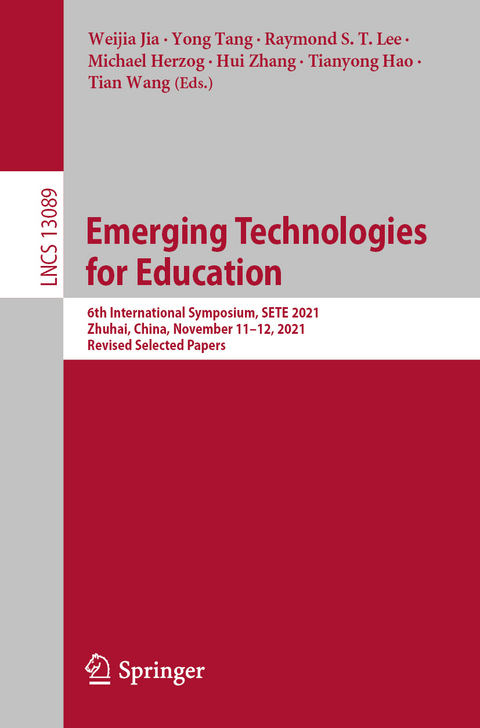
Emerging Technologies for Education
Springer International Publishing (Verlag)
978-3-030-92835-3 (ISBN)
This book constitutes the refereed conference proceedings of the 6th International Symposium on Emerging Technologies for Education, SETE 2021, held in Zhuhai, China in November 2021.
35 full papers were accepted together with 8 short papers out of 58 submissions. The papers focus on the following subjects: Emerging Technologies for Education, Digital Technology, Creativity, and Education; Education Technology (Edtech) and ICT for Education; Education + AI; Adaptive Learning, Emotion and Behaviour Recognition and Understanding in Education; as well as papers from the International Symposium on User Modeling and Language Learning (UMLL2021) and the International Workshop on Educational Technology for Language Learning (ETLL 2021).
Emerging Technologies for Education.- Mind Map based Computer Network Knowledge Graph Visualization Research and Application.- Student Experiences on Using Process-centric Thesis Management Tool.- AI-based Language Chatbot 2.0 - The Design and Implementation of English Language Concept Learning Agent App.- The Application of Virtual Simulation Technology in Law Teaching Practice.- The Effect of Online Collaborative Prewriting via DingTalk Group on EFL Learners' Writing Anxiety and Writing Performance.- Evaluation of Distance Learning from the Perspective of University Students - a Case Study.- Digital Technology, Creativity, and Education.- Enhancing EFL Learners' English Vocabulary Acquisition in WeChat Official Account Tweet-based Writing.- Online Statistics Teaching-assisted Platform with Interactive Web Applications using R Shiny.- Enhancing EFL learners' English Speaking Performance Through Vlog-based Digital Multimodal Composing Activities.-Mobile Learningassisted multimodal Chinese listening and speaking course.- On the Syntax and Semantics of Verbs of Searching.- Writing Collaboratively in the Continuation Task via Shared Docs.- Reflections on Applying Innovative Project-Based Learning: Shadow Play in OBTL Classroom.- Online Collision Avoidance Algorithm for Lightweight Web3D Robot Based on M-BVH.- Education Technology (Edtech) and ICT for Education.- The Teaching Design of Sequence Limit based on Modern Education Technology.- Reducing EFL Learners' Error of Sound Deletion with ASR-based Peer Feedback.- The Digital Competence of Vocational Education Teachers and of Learners With and Without Cognitive Disabilities.- Navigating the Higher Education Classroom of Covid-19: A Revisit of SAMR as a Guide for Meaningful Blended Learning Adoption.- Education + AI.- A parsing scheme of mind-map images.- "Research on OBE Online Teaching Mode Combined with Expression Recognition-Taking Digital Image Processing Course as an Example.- A Fitness Education and Scoring System based on 3D Human Body Reconstruction.- Threat Analysis of IoT Security Knowledge Graph Based on Confidence.- Adaptive Learning, Emotion and Behaviour Recognition and Understanding in Education.- Adversarial Training Leaded Robust MRC Method.- Deep Knowledge Tracking based on Exercise Semantic Information.- Automated Analysis of Student Verbalizations in Online Learning Environments.- A model of teachers' excellent teaching behaviors based on natural language processing.- International Symposium on User Modeling and Language Learning (UMLL2021).- Examining the Efficacy of Video-based Multimodal Three-Dimension Input on the Acquisition of English Phrases.- Synchronous CMC in ESP Class during the Pandemic: A Case Study in Wuhan.- Systematic evaluation of research progress on technology-enhanced language learning: content analysis and knowledge mapping.- The Effect of Oral Practice via Chatbot on Students' Oral English Accuracy.- Investigating the Impact of Teacher Feedback on Content Revisions in EFL Students' Writing by the Automated Tracking Approach.- Exploring the potential, features, and functions of small talk in digital distance teaching on Zoom: a mixed-method study by quasi-experiment and conversation analysis.- Chatbots for learning: A Facebook Messenger 'bot'.- International Workshop on Educational Technology for Language Learning (ETLL 2021).- Self-Assessment Activities of Translation: A Case Study of Undergraduate, Master and Doctoral Students.- Research on Construction and Application of Translation Self-Assessment Activity for Self-Regulated Learning in Chinese EFL Context.- Constructing a DELC-Based Blended Learning Model in the Interpreting Course.- Integrating Blended Learning in Computer-assisted Translation Course in Light of the New Liberal Arts Initiative.- Translation of Long English Sentences Based on Clause Complex Theory.- The Development of Artificial Intelligence Educationin Primary and Secondary Schools in Mainland China.- Scholar-Course Knowledge Graph Construction Based On Graph Database Storage.- Game-based Learning Models for Building Chinese College Students' Disciplinary English Literacy in Mathematics.- The Effect Analysis of Mind Mapping on Chinese EFL Undergraduates' Writing.- "Gold Course" in Higher Vocational Colleges Construction Standards Connotation, Principles, Paths and Evaluation.-
| Erscheinungsdatum | 30.01.2022 |
|---|---|
| Reihe/Serie | Information Systems and Applications, incl. Internet/Web, and HCI | Lecture Notes in Computer Science |
| Zusatzinfo | XVII, 488 p. 165 illus., 100 illus. in color. |
| Verlagsort | Cham |
| Sprache | englisch |
| Maße | 155 x 235 mm |
| Gewicht | 771 g |
| Themenwelt | Schulbuch / Wörterbuch ► Unterrichtsvorbereitung ► Unterrichts-Handreichungen |
| Mathematik / Informatik ► Informatik | |
| Schlagworte | Adaptive Learning • Applications • Artificial Intelligence • Computational Linguistics • Computer Science • Computer Supported Collaborative Learning (CSCL) • Computer systems • computer vision • conference proceedings • E-Learning • e-Learning Systems • Game-based Learning • Human-Computer Interaction (HCI) • Informatics • Information Retrieval • information systems • Learning Analytics • Natural Language Processing • NLP • online systems • Research • Signal Processing • Teaching Practices • Technology-Enhanced Learning |
| ISBN-10 | 3-030-92835-7 / 3030928357 |
| ISBN-13 | 978-3-030-92835-3 / 9783030928353 |
| Zustand | Neuware |
| Haben Sie eine Frage zum Produkt? |
aus dem Bereich


